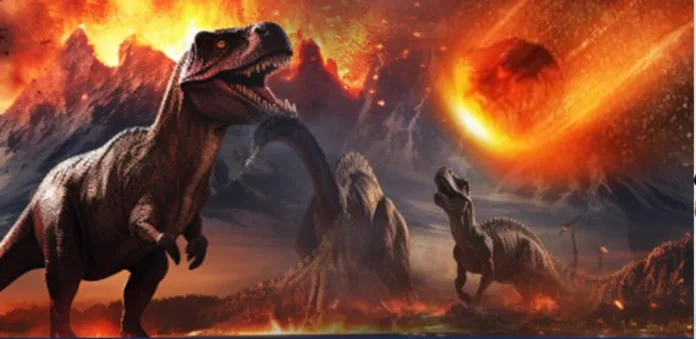New research reveals that the meteor responsible for the dinosaurs’ extinction originated beyond Jupiter, challenging long-held beliefs about its origin.
After decades of research and debate, scientists have finally pinpointed the origin of the meteor that led to the mass extinction of the dinosaurs. Contrary to previous theories that suggested a comet was the culprit, new findings confirm that the deadly impactor was an asteroid that originated from beyond Jupiter.
A team of researchers conducted an in-depth analysis of sediment samples from the Chicxulub crater, located on Mexico’s Yucatan Peninsula, where the catastrophic impact occurred about 65 million years ago. The study, led by geochemist Mario Fischer-Godde from the University of Cologne, focused on isotopes of the rare element ruthenium, which is more abundant on asteroids than comets.
By examining these isotopes, scientists determined the celestial origin of the asteroid, tracing it back to a region of the solar system beyond Jupiter. This discovery challenges the previously popular notion that a comet was responsible for the impact that created the Chicxulub crater and triggered a global catastrophe.
Fischer-Godde explained that while the asteroid’s exact location before its collision with Earth remains uncertain, it is believed to have travelled within the asteroid belt between Mars and Jupiter before being propelled toward our planet. The research team’s findings also debunk the idea that volcanic activity alone was responsible for the atmospheric changes that led to the dinosaurs’ extinction.
The impact of this colossal asteroid unleashed a series of catastrophic events, including a mega-earthquake, global winter, and a mass extinction event that wiped out nearly 75% of Earth’s species, including the dinosaurs. The collision would have sent trillions of tons of dust and debris into the atmosphere, leading to a dramatic cooling of the planet’s climate and disrupting ecosystems worldwide.
Fischer-Godde expressed hope that these new insights will not only deepen our understanding of Earth’s geological history but also help humanity prepare for any potential future asteroid collisions. He cautioned that if a similar C-type asteroid were to cross Earth’s orbit in the future, it could pose an existential threat to life on our planet.
This discovery represents a significant step forward in unravelling the mysteries of our planet’s past and underscores the importance of continued research in planetary science. The study’s findings have sparked renewed interest in the origins of Earth’s water and the role of asteroid impacts in shaping the evolution of life.
As scientists continue to explore the implications of this research, one thing remains clear: the asteroid that brought an end to the age of dinosaurs came from a distant, cold region of our solar system, far beyond the orbit of Jupiter.
Analysis:
Political:
The discovery of the meteor’s origin carries significant implications for planetary defence strategies, which are often guided by national and international policies. Governments and space agencies around the world are likely to take a renewed interest in tracking and mitigating asteroid threats, especially those that may originate from regions beyond Jupiter. This finding may prompt a reevaluation of current policies and increase funding for space programs dedicated to monitoring near-Earth objects. Additionally, international collaboration may be necessary to develop comprehensive strategies for detecting and deflecting potentially hazardous asteroids before they pose a threat to Earth.
Social:
The revelation about the asteroid’s origin reignites public interest in space science and the history of our planet. It also serves as a reminder of the fragile nature of life on Earth and the potential dangers that lie beyond our atmosphere. This discovery could spark discussions on the importance of space exploration and the need for humanity to be better prepared for cosmic threats. Furthermore, it highlights the value of scientific research in uncovering the mysteries of our past and ensuring the safety of our future. The public’s fascination with dinosaurs and the dramatic events that led to their extinction may drive greater support for scientific endeavours related to space and planetary defence.
Racial:
The study’s findings also touch on issues of scientific representation and inclusion. The field of planetary science has historically been dominated by researchers from certain regions and backgrounds, leading to a lack of diversity in perspectives and approaches. As we deepen our understanding of the universe, it is crucial to ensure that scientific research is inclusive and reflective of the diverse global community. This discovery serves as an opportunity to highlight the contributions of scientists from underrepresented groups and to encourage greater participation in space science and related fields. By fostering diversity in research, we can gain new insights and make more informed decisions about our planet’s future.
Gender:
Gender dynamics in the field of planetary science have also been a topic of discussion, with women historically underrepresented in this area. The contributions of female scientists like Sarah Hooper, who reported on this groundbreaking discovery, are crucial in bringing attention to important scientific developments. As more women enter and excel in the field of planetary science, their perspectives and experiences will enrich the research and help drive innovation. This discovery serves as a reminder of the importance of gender diversity in science and the need to support and promote the work of female scientists in all disciplines.
Economic:
The economic implications of this discovery are significant, particularly in the context of planetary defence and space exploration. As governments and private companies invest in technologies to detect and potentially deflect hazardous asteroids, new industries and job opportunities may emerge. This could lead to economic growth and the development of new technologies that have applications beyond planetary defence. However, the costs associated with these initiatives are substantial, and there may be debates over the allocation of resources. Balancing the need for planetary defence with other economic priorities will be a challenge for policymakers, but the potential consequences of inaction could be far more costly in the long run.
